Writing a good CV can be surprisingly challenging, especially when you have a long and accomplished career. When too much experience is on the table and you have multiple job titles to your name, how do you decide what to include and what to leave out? More importantly, how do you present a CV that highlights your extensive background without overwhelming the reader or appearing overqualified? Here’s how to strike the right balance, keep your CV sharp, and present yourself as the perfect fit for the role!
In this guide, we cover:
How far back should your CV go
Jobs you should leave off your CV
The best format for a CV with experience
How to shorten your CV to make it optimal.
Need a polished CV?
CV length: how far back should a CV go?
Let’s bust a myth upfront: your optimal CV length doesn’t always have to be one page. If you have relevant experience, it’s a good idea to include it, even if that pushes your document to 2 or 3 pages. The key is relevance and impact, not word count.
What matters most
The most recent 10 years of experience.
Accomplishments and impact in current and recent roles.
Strong keywords relevant to your industry and the job you're applying for.
What to avoid
Going back more than 15 years, unless those roles are highly relevant.
Listing outdated tools or software that no longer reflect modern work.
Lengthy descriptions and sharing too much information without relevance.
Best format for a CV with too much experience
When you have a long work history, format becomes critical to highlight what matters. Here are some formatting tips to structure your CV successfully.

Use a reverse-chronological order. Start with your most recent role and work backwards.
Create a master CV with your full employment history and tailor it for every job.
Keep your skills list concise and aligned to the job description.
Write short paragraphs and start bulleted lists with strong action verbs.
Avoid graphic elements and distracting templates. Many don’t pass applicant tracking systems (ATS).
Well-formatted CV example
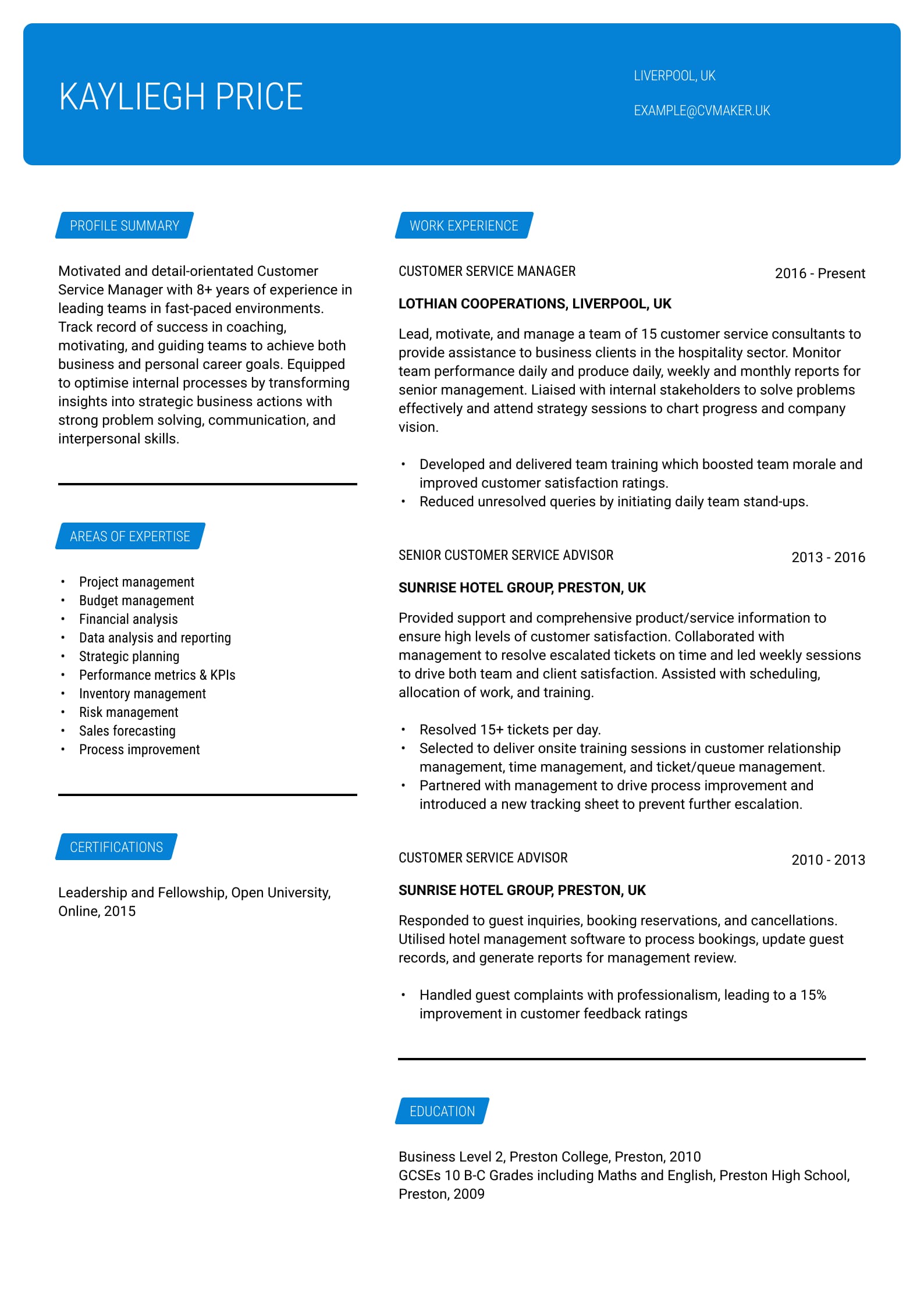
For more insights, explore our complete writing guide: Manager CV.
5 mistakes to avoid when writing a CV with too much experience
Do
Include only roles relevant to the position you’re applying for.
Don't
List every job you’ve ever had.
Do
When updating your accomplishments, focus on results: numbers, KPIs, and project outcomes.
Don't
Overuse vague descriptions like “responsible for” or “in charge of.”
Do
Use bullet points to make skills and achievements easy to skim.
Don't
Include outdated or irrelevant tech, skills, or job titles.
Do
Focus on adding more detail to your recent roles while streamlining the descriptions of older ones.
Don't
Include redundant roles or similar responsibilities over and over.
Do
Prioritise quality content over the quantity of pages or word count.
Don't
Stick to a specific CV length just because it is considered the norm.
Pro tip
For example, when applying for IT roles, there’s no need to list outdated tools unless the role you’re applying for specifically requests legacy tech knowledge or that specific technical skill.
Examples of CVs with too much experience (good and bad practices)
When applying for jobs, we often see having a wealth of work experience as a clear advantage. But there’s a twist: being overqualified for the job can actually hurt your chances. Employers may assume you’ll demand a higher salary or may worry you’ll get bored and leave. So how do you write a CV when you have a lot of experience that communicates value, not excess? See these examples.
Bad example of a CV with too much experience
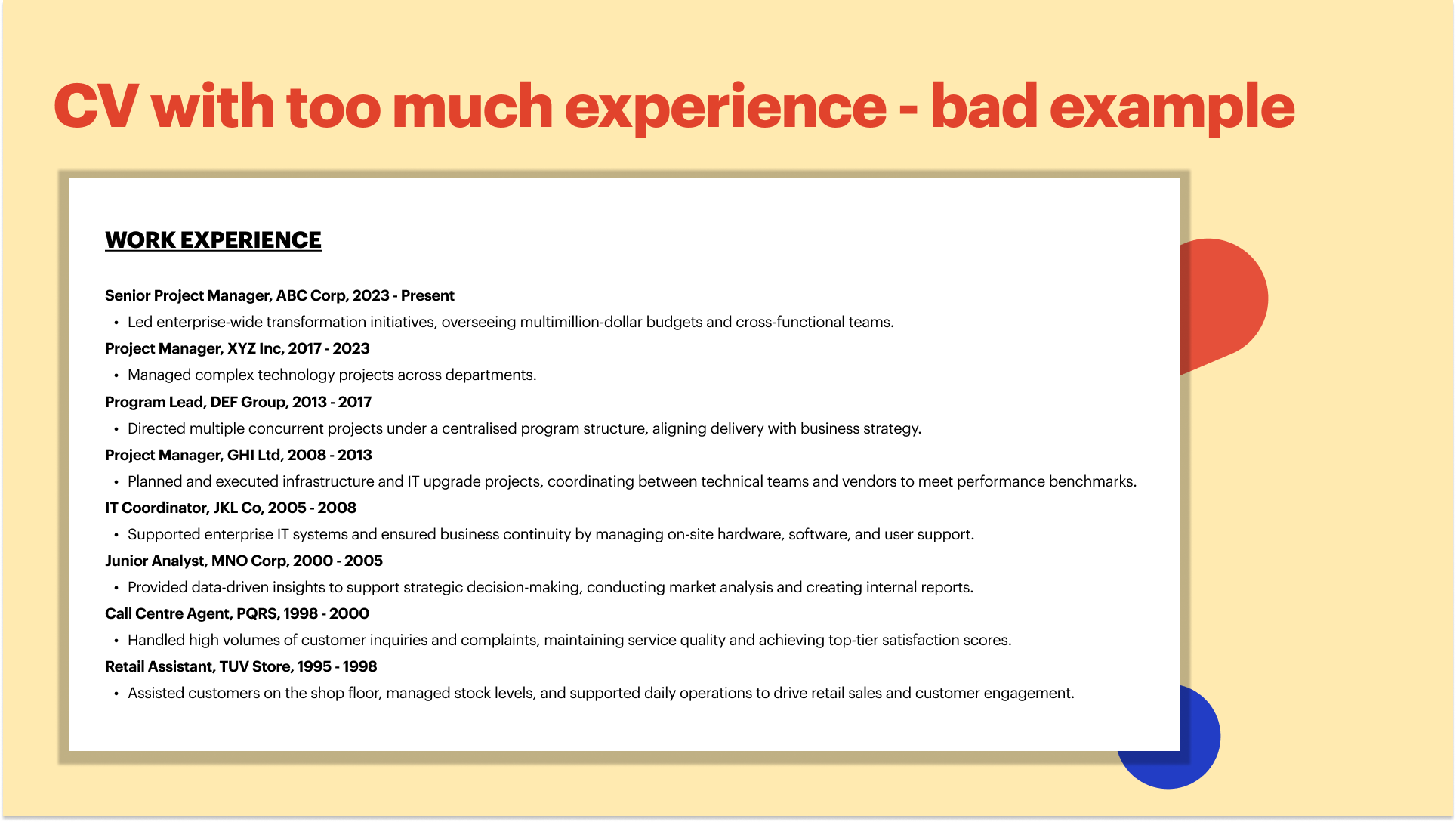
Why is this a bad example?
Lists 30 years of roles without filtering for relevance.
Equal weight to entry-level and senior roles.
No accomplishments, only duties.
Good example of a CV with too much experience
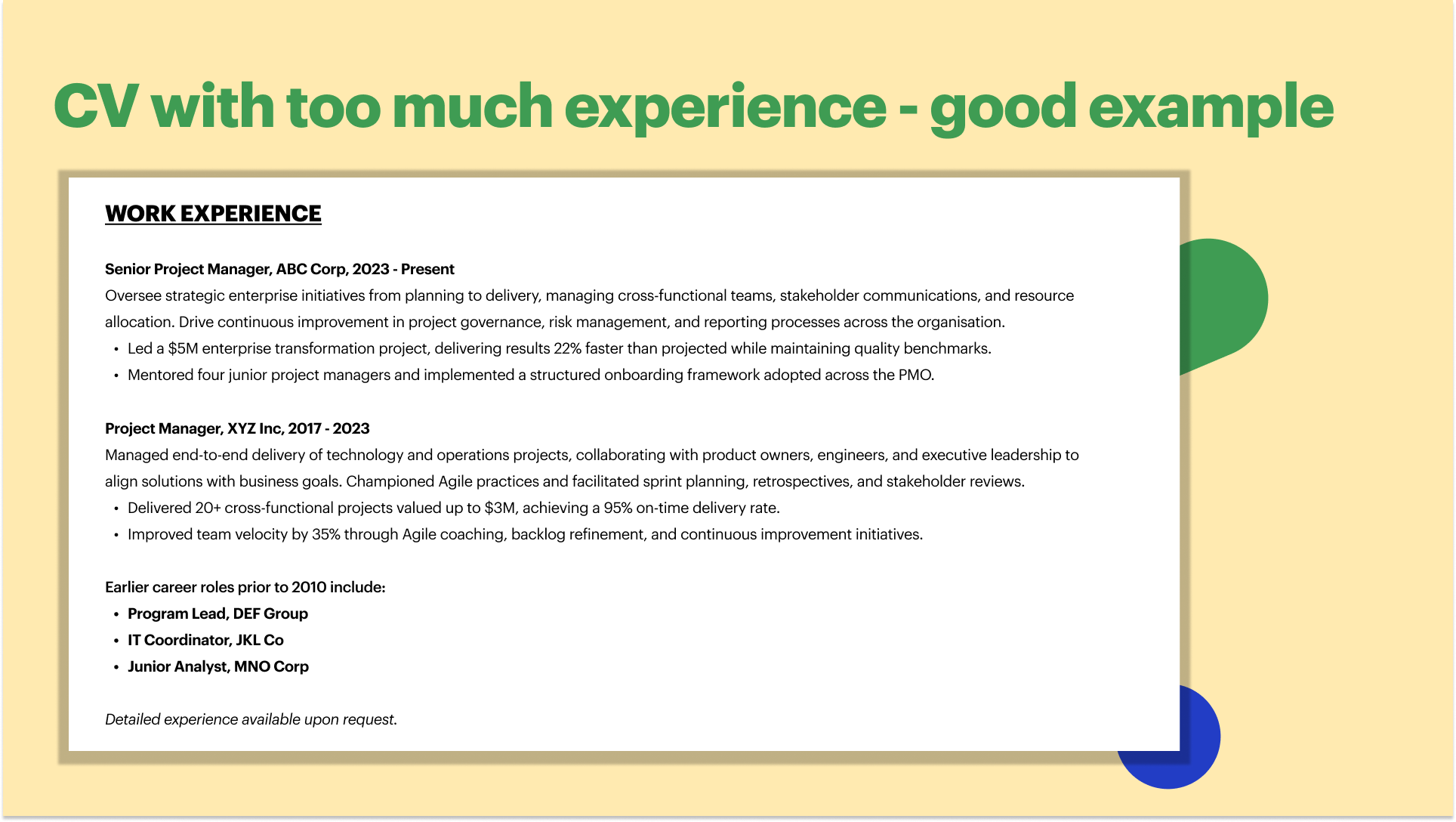
Why is this a good example?
Focus on the last years.
Groups older roles under “Earlier Career.”
Uses bullet points with measurable impact.

Personal profile examples for a CV with too much experience
The personal profile CV section (also called a summary or professional statement) should highlight your value proposition, not just your career goals.
Tips for your personal statement:
Focus on achievements, not duties.
Highlight what you’ve done, not what you want.
Make it specific, measurable, and tailored.
Weak CV personal profile examples:
Marketing
"Looking for a marketing position where I can grow my skills and be part of a dynamic team."
Finance
"Experienced finance professional seeking a challenging opportunity in a respected company."
IT
"Motivated IT specialist who enjoys working with computers and learning new technologies."
Retail
"Hardworking retail worker looking for a job that will help me build a long-term career in customer service."
Designer
"Creative designer with a passion for visual arts and an interest in working on exciting projects."
Strong CV personal profile examples:
Marketing
"Results-driven marketing strategist with 8+ years of experience leading data-informed campaigns that boosted lead conversion by 30%; skilled in digital marketing, brand positioning, and audience segmentation."
Finance
"Chartered financial analyst with 10+ years in investment banking and corporate finance; known for driving risk-adjusted portfolio returns and delivering strategic financial insights that support $100M+ business decisions."
IT
"IT project manager with a track record of delivering enterprise software solutions on time and under budget; expert in Agile methodologies, cloud infrastructure, and cross-functional team leadership."
Retail
"Customer-focused retail supervisor with 6 years of experience optimising floor operations and training staff; increased upsell performance by 18% and improved inventory accuracy by 25% in high-volume environments."
Designer
"Award-winning graphic designer with a strong background in UI/UX, branding, and digital design; created scalable visual systems that improved user engagement by 40% for top-tier e-commerce clients."
7 tips for making your CV concise yet impactful
1. Follow the '2-3 rule'
Limit bullet points under each job to 2-3 of your strongest, most measurable achievements, and keep them to one line where possible. This prevents overcrowding and forces prioritisation.
Pro tip
Use short, punchy sentences with action verbs and trim unnecessary details that don’t support your core message.
2. Cut the fluff words
Eliminate empty or filler terms like “various responsibilities,” “successfully,” “responsible for,” or “worked on.” Instead, go straight to the result and action.
Don't say
“Successfully worked on marketing campaigns.”
Do say
“Launched digital campaigns that drove a 20% increase in web traffic.”
3. Avoid duplicating responsibilities across roles
If you've had similar duties in multiple jobs, summarise them once in the most recent relevant role. No need to repeat the same tasks word-for-word throughout.
Bad example
Senior Project Manager: Led cross-functional teams, managed budgets, tracked project timelines. Project Manager: Led cross-functional teams, managed budgets, tracked project timelines.
Good example
Senior Project Manager:
- Directed enterprise-level initiatives, aligning global teams across three continents and integrating new digital platforms into existing infrastructure.
Good example
Project Manager:
- Delivered mid-scale IT projects, introducing Agile methodology and improving departmental delivery speed by 35%.
4. Use white space intentionally
Don’t fear blank areas. Adequate spacing makes your CV easier to scan and helps important points stand out. Remember, horror vacui (the fear of emptiness) can lead to cluttered designs.
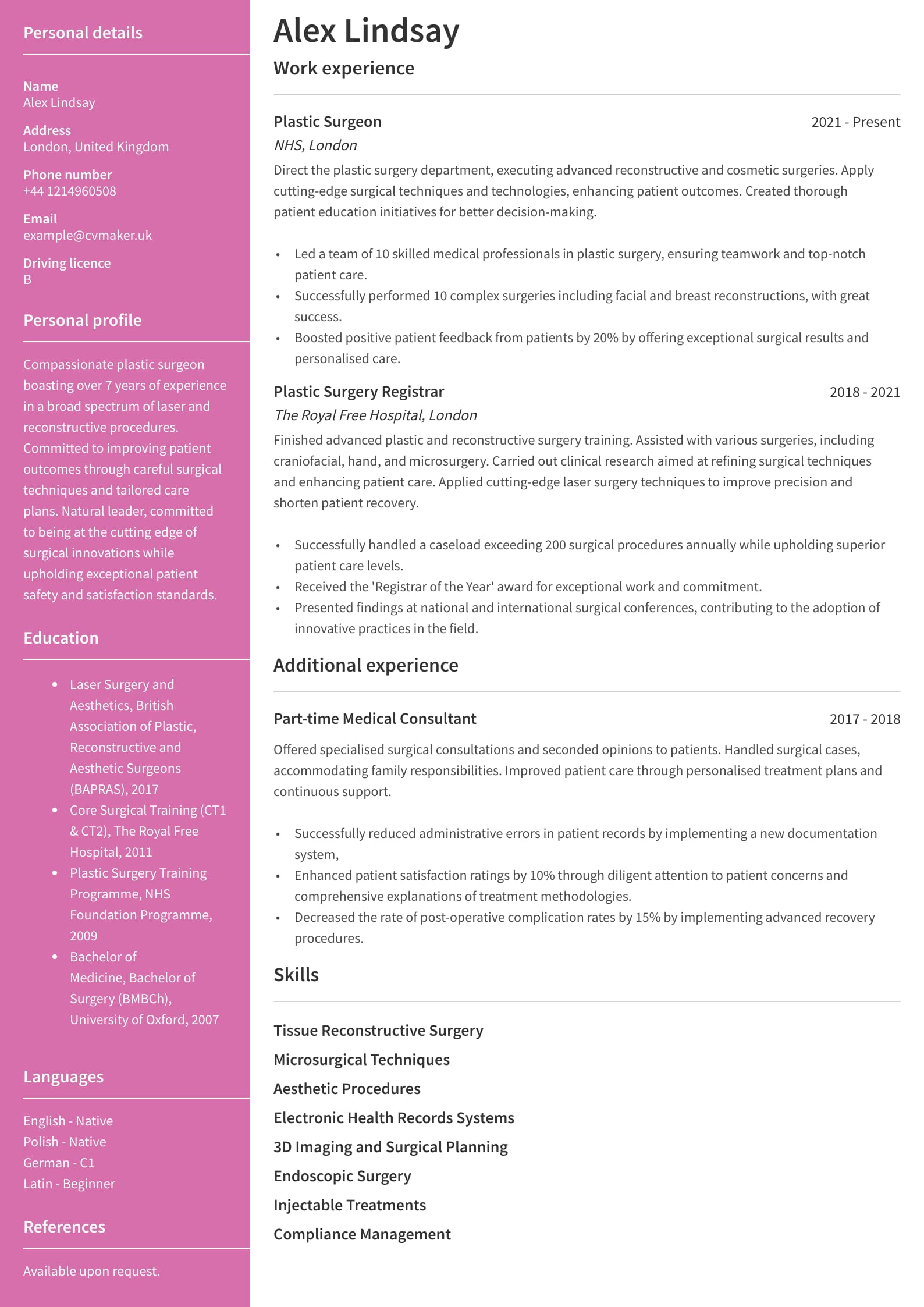
Check out this Plastic Surgeon CV and more CV examples for inspiration.
5. Use sections strategically
Group less relevant roles under “Earlier Career” or “Additional Experience” sections, with just job titles and dates. This acknowledges them without stealing focus.
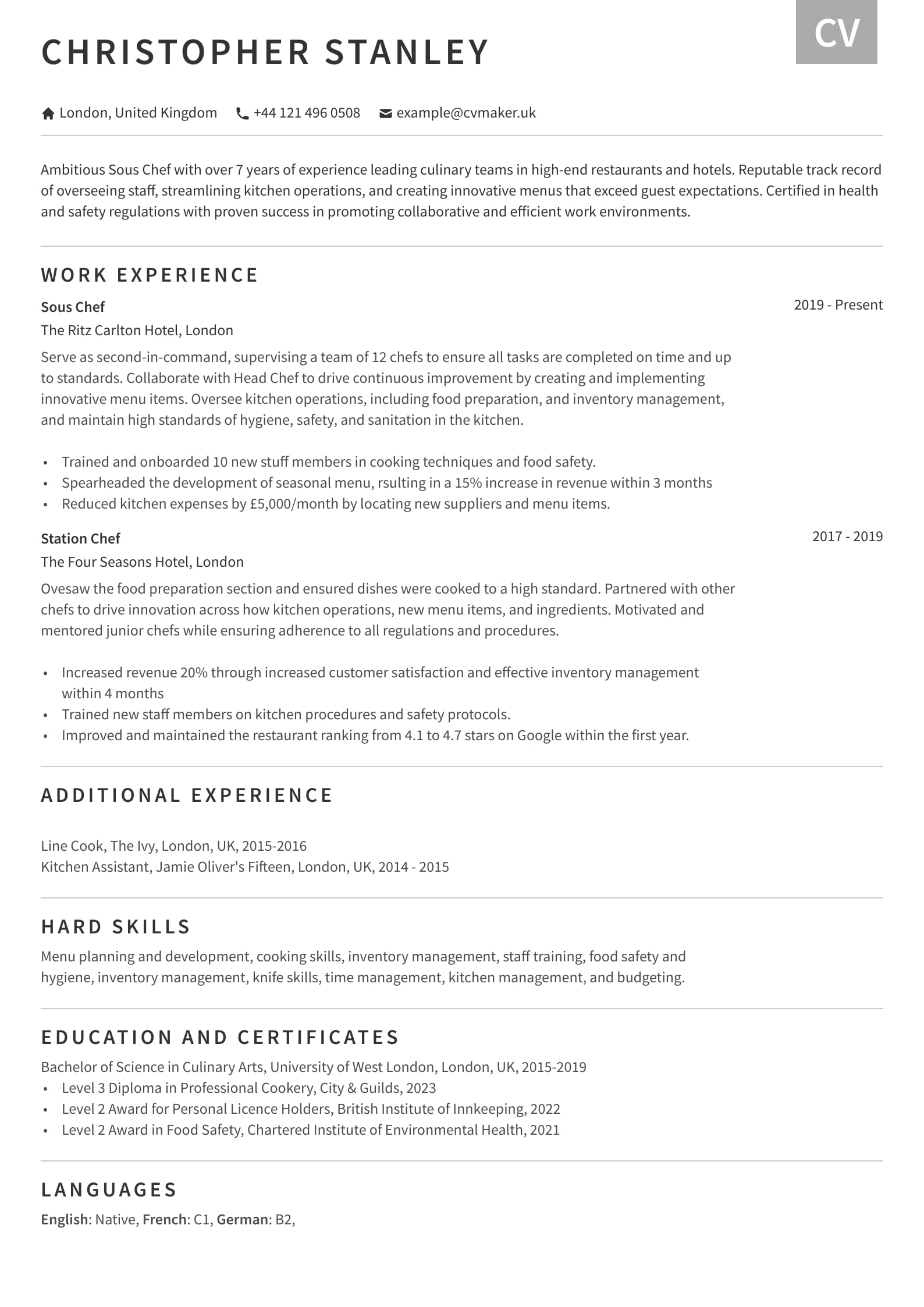
For more inspiration, explore our complete writing guide: Chef CV
6. Add context with numbers
Even small metrics can make achievements feel more tangible. Consider factors like scope, scale, and impact: budgets managed, team size, growth percentages, and more.
Bad "achievements" section
- Managed budgets and improved processes. - Increased sales and led team meetings.
Good "achievements" section
- Managed annual budgets exceeding $3M, optimising resource allocation to reduce costs by 12%. - Increased regional sales revenue by 18% year-over-year through targeted promotional campaigns.
7. Read it out loud
If a sentence feels awkward or long when spoken, it probably is. Reading your CV out loud helps catch clunky phrases or repetitions that you can remove or rewrite.
Pro tip
Trim the excess, tailor every time, and draw attention to your most relevant experience. A focused, job-specific CV will open more doors than a long, unfocused one ever could.
The Best CV Builder
Effortlessly create a professional CV
Easy to use on any device
Integrated spelling and grammar check
Customisable job-specific CV examples
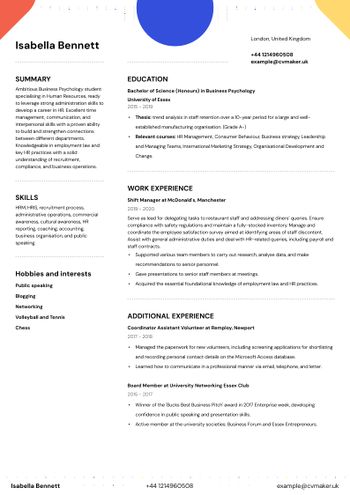
The role of a cover letter when you have extensive experience
We often question whether a cover letter is truly necessary, but it becomes particularly valuable when showcasing extensive work experience.
A good cover letter is your chance to:
Explain your interest in the specific role (especially if you’re applying for something “beneath” your experience level).
Show cultural fit and enthusiasm without repeating your CV.
Position yourself as someone who brings depth but still wants to grow.
Reassure the reader that you're not just looking for "any job".You want this job.
Cover letter paragraph example
“While I’ve led large-scale projects globally, I’m excited by this role’s opportunity to return to a more hands-on, impactful delivery environment where I can mentor a team and drive outcomes directly.”
Essentials for a CV with too much experience
Focus on the last 10 years.
Format for clarity, impact, and relevance.
Avoid overwhelming detail, especially from early in your career.
Use a job-specific CV for each application.
Let your cover letter and personal profile show (and delve deeper into) your unique value.
Next steps?
Having too much experience on your CV doesn’t mean you won’t get hired; it just requires a smart approach. Focus on being selective, concise, and framing your experience to highlight the value you bring to the role you’re applying for. To achieve this, try our fully customisable CV templates designed to outsmart ATS. If CV writing feels overwhelming, let us handle it for you! Our CV Writing Service is here to help create a standout application that boosts your chances of success. Struggling to get interviews? Visit our career blog for expert advice on how to start a professional cover letter, acing job interview outfits, and more.
FAQs
Is it an issue to have a lot of experience in your CV?
Not if you present it strategically. The key is relevance, not quantity. Don’t let too much experience make you look overqualified or out of touch.
Remember, having a lot of experience is a great asset, but only if you present it wisely. Think of your CV not as a list of everything you’ve ever done, but as a curated story of why you’re the best candidate for the job you're applying for.
How do I professionally say I have a lot of experience?
Use phrases like “seasoned professional,” “extensive track record,” or “20+ years’ experience in XYZ industry” in your personal summary. The best you can do is let your achievements speak for you.
Does it look bad if I have a lot of jobs on my CV?
It depends. Too frequent job or career changes can raise flags, but if you group similar roles and focus on skills and achievements, it can show adaptability and growth.
What jobs should you leave off your CV?
You can safely leave out:
Very early-career jobs (unless they’re relevant).
Short-term roles not related to your current path.
Outdated tech or industry-specific jobs no longer practised.
If you’re concerned about employment gaps, briefly list older roles without full detail (e.g., “Various freelance roles, 2000-2005”).
)



)
